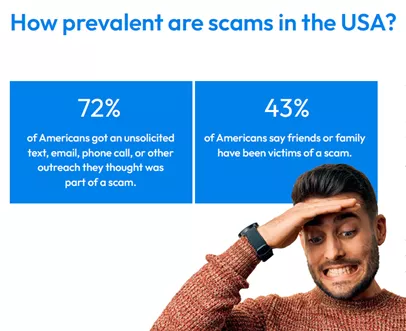The perception of certain industries as scammy has become increasingly common, fueled by misleading practices, lack of transparency, and a focus on short-term gains over long-term value. From misleading advertising to hidden fees, consumers often feel distrustful and skeptical. This sentiment not only harms customer relationships but also tarnishes the reputation of entire sectors. However, the solution lies in fostering accountability, ethical practices, and clear communication. By prioritizing honesty, improving regulations, and empowering consumers with knowledge, industries can rebuild trust and reduce the scammy label. This article explores actionable steps to create a more transparent and trustworthy business environment.

Is the Whole Industry Scammy? Feels Very Scammy. How to Make It Less So?
The perception that an entire industry is scammy often stems from a combination of unethical practices, lack of transparency, and poor customer experiences. To address this issue, it’s essential to identify the root causes and implement strategies that promote trust, accountability, and fairness. Below, we explore actionable steps to reduce the scammy feeling and improve the industry's reputation.
1. Why Does the Industry Feel Scammy?
The industry may feel scammy due to misleading advertising, hidden fees, and lack of regulation. Many companies prioritize short-term profits over long-term customer satisfaction, leading to distrust. Additionally, the rise of online platforms has made it easier for fraudulent actors to operate without accountability.
See Also Developing Carbon Credits From Southern United States Pine Plantations
Developing Carbon Credits From Southern United States Pine Plantations| Issue | Impact |
|---|---|
| Misleading Advertising | Creates false expectations |
| Hidden Fees | Erodes trust in pricing |
| Lack of Regulation | Allows unethical practices to thrive |
2. How Can Transparency Improve the Industry?
Transparency is key to reducing the scammy perception. Companies should clearly communicate pricing, terms and conditions, and product limitations. Providing detailed information upfront helps customers make informed decisions and builds trust.
| Action | Benefit |
|---|---|
| Clear Pricing | Prevents hidden fees |
| Detailed Terms | Reduces misunderstandings |
| Honest Advertising | Sets realistic expectations |
3. What Role Does Regulation Play?
Strong regulation and enforcement are crucial to curb unethical practices. Governments and industry bodies should establish clear guidelines and penalties for non-compliance. This ensures that companies operate within ethical boundaries and protects consumers from exploitation.
| Regulatory Measure | Outcome |
|---|---|
| Strict Guidelines | Prevents fraudulent activities |
| Regular Audits | Ensures compliance |
| Consumer Protection Laws | Empowers customers |
4. How Can Customer Education Help?
Educating customers about their rights and how to spot scams can significantly reduce the industry's scammy reputation. Providing resources, guides, and support empowers consumers to make better decisions and avoid falling victim to fraudulent schemes.
See Also The Importance of Micro and Off-Grid Systems in Funding and Accelerating Energy Transitions
The Importance of Micro and Off-Grid Systems in Funding and Accelerating Energy Transitions| Educational Tool | Benefit |
|---|---|
| Scam Awareness Guides | Helps identify red flags |
| Customer Support | Provides assistance and clarity |
| Online Resources | Offers accessible information |
5. What Steps Can Companies Take to Build Trust?
Companies must prioritize ethical practices, customer satisfaction, and accountability. Implementing feedback systems, money-back guarantees, and ethical marketing can help rebuild trust and improve the industry's overall reputation.
| Strategy | Impact |
|---|---|
| Feedback Systems | Encourages continuous improvement |
| Money-Back Guarantees | Reduces risk for customers |
| Ethical Marketing | Builds long-term credibility |
Strategies to Reduce the Perception of Scamminess in the Industry
Understanding Why the Industry Feels Scammy
The perception that an industry is scammy often stems from a lack of transparency, unethical practices, or misleading marketing tactics. Many industries, especially those involving financial products, health supplements, or online services, have been criticized for prioritizing profits over customer well-being. This creates a trust deficit among consumers, who feel exploited or misled. To address this, it’s crucial to identify the root causes of these perceptions, such as hidden fees, exaggerated claims, or poor customer service. By acknowledging these issues, businesses can take the first step toward rebuilding trust and improving their reputation.
Promoting Transparency in Business Practices
One of the most effective ways to reduce the scammy perception is by fostering transparency. Companies should clearly communicate their pricing, terms, and conditions without hiding critical details in fine print. For example, subscription-based businesses can provide easy-to-understand cancellation policies and avoid auto-renewal traps. Additionally, openly sharing information about product sourcing, manufacturing processes, or service limitations can help build credibility. When customers feel informed and respected, they are more likely to trust the industry as a whole.
See Also What Are the Main Problems With Regenerative Agriculture Credits?
What Are the Main Problems With Regenerative Agriculture Credits?Implementing Ethical Marketing Strategies
Ethical marketing is essential to combat the scammy image of an industry. This involves avoiding exaggerated claims, false advertising, or manipulative tactics designed to pressure customers into making quick decisions. Instead, businesses should focus on providing accurate, evidence-based information about their products or services. For instance, health and wellness companies can cite scientific studies to support their claims, while financial institutions can offer realistic projections instead of promising guaranteed returns. By prioritizing honesty and integrity, companies can differentiate themselves from less scrupulous competitors.
Enhancing Customer Support and Accountability
Poor customer service often contributes to the perception of an industry being scammy. To address this, businesses should invest in responsive and empathetic customer support teams that can resolve issues promptly and effectively. Implementing clear channels for complaints, refunds, or disputes can also demonstrate accountability. For example, e-commerce platforms can offer hassle-free return policies, while service providers can provide detailed explanations for any charges. When customers feel heard and supported, they are less likely to view the industry as exploitative.
Encouraging Industry-Wide Standards and Regulations
While individual businesses can take steps to improve their reputation, industry-wide standards and regulations are necessary to address systemic issues. Governments, trade associations, and consumer advocacy groups can play a key role in establishing guidelines that promote fairness and accountability. For example, stricter regulations on data privacy, advertising practices, or product quality can help weed out unethical players. By working together, stakeholders can create an environment where scammy practices are less tolerated, benefiting both consumers and reputable businesses.
Frequently Asked Questions (FAQ)
Why does the industry feel so scammy to many people?
The perception of the industry as scammy often stems from a lack of transparency, misleading marketing tactics, and the prevalence of bad actors. Many companies prioritize short-term gains over long-term customer satisfaction, leading to practices like hidden fees, exaggerated claims, or poor-quality products. Additionally, the rise of online platforms has made it easier for fraudulent schemes to proliferate, further eroding trust. When consumers encounter these issues repeatedly, it creates a negative bias toward the entire industry, making it feel inherently untrustworthy.
What are some common red flags that make the industry seem scammy?
Several red flags contribute to the scammy reputation of the industry. These include overly aggressive sales tactics, promises of unrealistic results, lack of clear communication, and refusal to provide detailed information or contracts. Companies that pressure customers into quick decisions or avoid answering direct questions often raise suspicions. Additionally, the absence of genuine customer reviews or reliance on fake testimonials can signal dishonesty. Recognizing these warning signs can help consumers avoid falling victim to unethical practices.
How can companies work to make the industry less scammy?
To reduce the scammy perception, companies must prioritize transparency, accountability, and customer-centric practices. This includes providing clear and honest information about products or services, avoiding misleading claims, and ensuring fair pricing. Implementing robust customer support systems and actively seeking feedback can also build trust. Additionally, adhering to ethical standards and industry regulations, as well as publicly addressing and rectifying mistakes, can demonstrate a commitment to integrity. Over time, these efforts can help shift the industry's reputation toward one of reliability and trustworthiness.
What role do consumers play in reducing the scammy nature of the industry?
Consumers have a significant role in combating the scammy aspects of the industry. By educating themselves about common scams and staying vigilant, they can avoid falling prey to unethical practices. Sharing honest reviews and experiences can also hold companies accountable and help others make informed decisions. Additionally, supporting businesses that prioritize transparency and ethical practices encourages a shift toward better industry standards. When consumers demand higher accountability and refuse to engage with dishonest companies, they contribute to creating a healthier and more trustworthy marketplace.
Leave a Reply


Our Recommended Articles